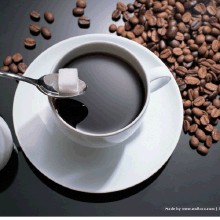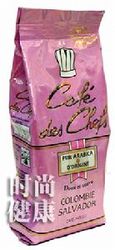Tell me about individual boutique Java coffee.
Java coffee is produced on the Indonesian island of Java and belongs to Arabica coffee. After baking, the bitter taste is extremely strong and the aroma is very light, without sour taste. The bitterness and mellowness of Java coffee, coupled with the sweetness of chocolate syrup, make Java coffee more mellow and palatable and very popular with women!
Introduction Editor in coffee-producing Asian countries, Indonesia is a very noteworthy one. Indonesia is an island country in the Indian Ocean, the islands are distributed on both sides of the equatorial line, of which three islands: Java, Sumatra and Sulawesi produce the world's important coffee. In the mid-17th century, the Dutch brought coffee trees to Ceylon (Sri Lanka) and Java, Indonesia. In the 18th century, Indonesia became a major producer of coffee, and almost all of its high-quality Arabica coffee was supplied to Europe. But by the 19th century, coffee rust, which appeared in Ceylon in 1869, also affected Indonesia. By 1877, most of the coffee fields on the Indonesian islands had been damaged by rust, and the Dutch had to import other coffee varieties from Africa, namely Romsda coffee. It is more resistant to diseases and insect pests, but its quality is inferior. About 90 per cent of Indonesian coffee is Romda beans, about 6.8 million bags a year, and less than 10 per cent of beans are Arabica coffee.
Coffee produced in Indonesia generally does not have the name "Indonesia", but directly bears the name of the island, such as Java, Sumatra and so on.
Cultural editors are famous for Java coffee in the early years, which refers to Arabica coffee formerly produced on the island of Java. It has a strong aroma, low acidity, taste lubrication, mixed with mocha coffee, the resulting "Java mocha mixed coffee" was once popular and became synonymous with top coffee.
At that time, Java coffee sold to Europe was a very special kind of coffee. At that time, it was shipped to Europe and the United States by sailboat, and the distance was long and the speed was slow, so it took a lot of time to transport. In this case, the coffee seems to have undergone a special fermentation and has a very unique taste.

High-quality Java coffee later, when ships replaced sailboats, people drank relatively fresh coffee beans because of the shortened delivery time. But people who are used to drinking Chen beans are not used to the fresh taste, so they desperately pursue old Java coffee, so that the Indonesian government and some businessmen deliberately store fresh beans in warehouses for one or two years and then sell them to consumers. In fact, compared with fresh beans, the acidity of aged Java beans is close to zero, but the flavor is more intense. Because of the long storage time, the increase in cost and the limited quantity, Java has always been a hot item in the coffee market. In the 1880s, some profiteers deliberately tampered with some fresh Guatemalan or Venezuelan beans to mimic the high prices of old Java. It is intolerable that profiteers dye coffee beans to make them look more like old Java, but there is no doubt that the dyed chemicals are certainly toxic.
Java produces only a small amount of Arabica beans, most of which were imported from Africa after the rust disaster. This coffee has a strong bitter taste after roasting, but the aroma is extremely light. Although the acidity is low and the taste is delicate, it is rarely used for direct drinking. It is often used to mix mixed coffee or to make instant coffee.
Diseases and insect pests are really a powerful thing. It has greatly reduced coffee production in Brazil and repeatedly influenced the international coffee market. It has also made Sri Lanka, which used to plant coffee trees all over, cut down coffee trees and plant coffee instead. It also makes Java, which is rich in high-quality Arabica coffee, switch to Romsda coffee for fear of diseases and insect pests. Arabica Java coffee, which is regarded as a treasure, has been out of sight since then, and people's unlimited favor and pursuit of Java coffee has been lost ever since.
The aroma of Java coffee is rich and thick, with clear high-quality acidity, high balance, and sometimes nutty flavor. In terms of appearance and quality, Java coffee is excellent, just like a woman's vaguely charming, charming and just right, memorable.
Each caffeine variety has a different origin and has its own strong character, such as the masculine Mantenin, which resembles the character of an iron and steel man; mellow, fragrant blue mountain coffee, and gentle women are addicted to missing. Java Coffee, which has always been light and fragrant, is suitable for those who like light sex. Such people do not want to drink coffee as a sitting thing, from sour, sweet, bitter, astringent experience what profound philosophy of life, just want to simply drink a cup of delicious coffee, a cup of hot Java coffee, let these people realize that "the realm of life is rich and quiet." Quiet, because of getting rid of the temptation of external fame and gain; rich, because of having the treasure of the inner spiritual world. The happiness of life is to reap such an incisive interpretation of the realm.

Java coffee the sour, bitter and sweet tastes of Java coffee match just right. Unique fragrance, after drinking, the aroma fills the whole mouth. Exhale the aroma from the mouth again from the nose, the smell is very full. Maybe you will find it too overbearing, because it will quickly occupy your taste buds, your mind and even your soul. Why resist it? The life we live in is full of sour, sweet, bitter and astringent, so let the smell of coffee take away everything in the world. What we enjoy is not just a cup of coffee, but also the quiet moment that coffee brings to us.
Java has a mild, humid and diverse climate that makes it a harvest season all year round, with different kinds of coffee ripening at different times. What they grow is the unique quality of Java coffee beans, the coffee ground by this coffee bean, rich taste, endless aftertaste, can be called high-quality coffee. Many people equate "Java coffee" with "high quality" and "good taste".
The world coffee is divided into two series, one is the "hard" coffee represented by Brazil, which has a strong flavor, and the other is the "soft" coffee represented by Java coffee, which has a light flavor. The difference lies in the altitude of the producing area and the planting method, the coffee is planted in the hilly red soil is more extensive, Java is produced in the mountain black soil intensive cultivation.
Java coffee has a kind of bitter experience, it is as astringent as life, but bitterness is necessary in life, and the last fragrance at the root of the tongue is a thorough recollection of the past. Looking back on the hardship in the past, I will feel its sweetness and warmth even more, and I want to let the mood stop in the consciousness that begins to awaken for a long time. Suffering is pain, clear and quiet, the last fragrance has become a kind of spiritual victory.
4 flavor editor fragrant, full-bodied, with fruit flavor, taste rich and perfect. Java coffee has a wonderful fruit flavor, with a BlackBerry and grapefruit flavor, is a favorite of many coffee gluttons. This coffee has an excellent medium purity, crisp and refreshing taste. It has a fresh flavor and is most suitable for drinking iced coffee in summer. When tasting this coffee, if it is paired with sour fruits such as grapefruit, it will certainly give me the best coffee experience. "not much like coffee, but a bit like fruit tea" is the common feeling of many people about this kind of shallow roasted Java coffee.

Java mocha coffee not only has obvious and charming fruit acid, because Java coffee mostly comes from small coffee farmers, grows in different environments, encounters different climate and rainfall every year, and brings a variety of distinct and unique personalities. Take the AAPlus grade "KenyaAA+Samburu" as an example, the Samburu in 2001 has a strong aroma of black plum, the acidity is not high, and the taste is strong. The newly harvested Samburu in the winter of 2002 presents a completely different flavor, mulberry and green plum, with a little Nanyang spice (Spicy) flavor, after drinking, the aftertaste has the sweetness of green tea, the acidity is slightly higher than the year before, the taste is still strong. The common Puth taste is not strong, but it has a bright fruit-like flavor, some spicy and some red wine. This is how Puth makes coffee fans full of expectations and surprises!
5 noun interpretation editor flavor [Flavor]: the overall impression of aroma, acidity, and mellowness.
Acidity [Acidity]: the strong acidity of all coffee grown on the plateau. The sour here is different from bitterness and Sour, and has nothing to do with pH value. It refers to a fresh and lively quality that promotes coffee to exert its functions of invigorating the mind and clearing the taste. The acidity of coffee is not the acidity or sour smell of acidity or alkalinity, nor is it an uncomfortable acid that enters the stomach. When making coffee, the performance of acidity is very important. under good conditions and skills, a special taste with fresh acidity can be developed, which is a necessary condition for high-grade coffee. The sour taste of coffee describes a lively, bright flavor, which is somewhat similar to that used in wine tasting. If the coffee bean lacks acidity, it is equal to lose vitality, taste empty and boring, without layer depth. Acidity has many different characteristics, such as coffee beans from Yemen and Kenya, which have an impressive fruity aroma and a red wine-like texture.
Mellow [Body]: the taste of the tongue after drinking coffee. The change of mellowness can be divided into light to light, medium, high, fat, and even Indonesian coffee is as thick as syrup.
Odor [Aroma]: the smell and aroma emitted after the coffee has been prepared. The words used to describe smell include caramel, carbon roast, chocolate, fruit, grass, malt, and so on.
Bitterness [Bitter]: bitterness is a basic sense of taste, and the sensory area is distributed in the base of the tongue. The bitterness of deep baking is deliberately created, but the common cause of bitterness is too much coffee powder and too little water.
Light [Bland]: coffee grown in lowlands, usually quite light and tasteless. Coffee with insufficient coffee powder and too much water will have the same light effect.
Salty [Briny]: after brewing, if the coffee is overheated, it will produce a salty taste.
The aroma of soil [Earthy]: commonly used to describe spicy and earthy Indonesian coffee, not the smell of dirt on coffee beans.
Uniqueness [Exotic]: describes coffee with its unique aroma and special flavor, such as flowers, fruits, and spices. Coffee from East Africa and Indonesia usually has this property.
Aromatic alcohol [Mellow]: used to describe coffee with good acidity balance.
Mild [Mild]: used to describe a coffee with a harmonious, delicate flavor, used to refer to all plateau coffee except Brazil.
Soft [Soft]: describes low acidity coffee such as Indonesian coffee, and also describes it as mellow or sweet.
Sour [Sour]: a sense of taste in which the sensory area is mainly located at the back of the tongue and is characteristic of light roasted coffee.
Spice [Spicy]: a flavor or smell reminiscent of a particular spice.
Strong [Strong]: technically, it describes the advantages and disadvantages of various tastes, or the relative ratio of coffee to water in a particular conditioned product. In terms of popular usage, it describes the strong flavor of deep-roasted coffee.
Sweet [Sweet]: in essence, it is like fruit, and it also has something to do with the taste of wine.
Wild [Wild]: describes coffee with extreme taste characteristics.
Wine [Winy]: fruit-like acidity and smooth mellow, created by the contrast of special flavor. Kenyan coffee is the best example of wine flavor. In addition: coffee beans can only be roasted to become coffee beans for grinding and drinking, generally divided into light, medium, deep and extra-deep roasting.
Important Notice :
前街咖啡 FrontStreet Coffee has moved to new addredd:
FrontStreet Coffee Address: 315,Donghua East Road,GuangZhou
Tel:020 38364473
- Prev

Boutique Kenyan coffee
Kenyan coffee is mostly grown at an altitude of 1500m, 2100m, and is harvested twice a year. Its main feature is a distinct fruit aroma, the common fruit aroma is citrus. Kenyan coffee has a multi-layered taste and juice acidity, perfect grapefruit and wine flavor, moderate mellow, is the favorite of many people in the coffee industry. Kenya Coffee borrows Hollywood movies
- Next

The best gift in Sumatra, boutique Manning coffee.
Manning Coffee: Manning Coffee is produced in Sumatra, Indonesia, Asia, also known as Sumatran Coffee. Her flavor is very rich, fragrant, bitter, mellow, with a little sweetness. Most coffee lovers drink on their own, but it is also an indispensable variety for blending coffee. Manning coffee is produced in Sumatra, Indonesia, Asia, also known as Sumatran coffee.
Related
- Guji coffee producing area of Guji, Ethiopia: Humbela, Shakiso, Wulaga
- What is the most expensive variety of Qiloso in BOP multi-variety group?
- How to store the coffee beans bought home?
- Why are Yemeni coffee beans so rare now?
- Ethiopian Sidamo all Red Fruit Sun Sun Santa Vini Coffee beans
- SOE is mostly sour? What does it mean? Is it a single bean? what's the difference between it and Italian blending?
- Is Italian coffee beans suitable for making hand-brewed coffee?
- How to choose coffee beans when making cold coffee? What kind of coffee beans are suitable for making cold coffee?
- Just entered the pit to make coffee, what kind of coffee beans should be chosen?
- Can only Japan buy real Blue Mountain Coffee? What are authentic Jamaican Blue Mountain coffee beans?

